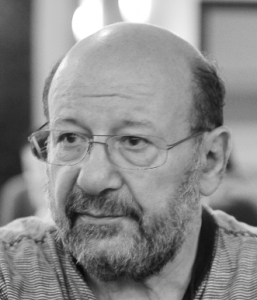“ The last thing I want to do is develop media to get in the way of person-to person interchange because… I think all communication should end with either a handshake or a kiss.” This quote from George C. Stoney, pioneer of public-access television, highlights the importance of encouraging participation on the production side of media – and also served as the focal point of Brian Winston‘s recent lecture at American University, “Is Clicktivism Enough?”
The last thing I want to do is develop media to get in the way of person-to person interchange because… I think all communication should end with either a handshake or a kiss.” This quote from George C. Stoney, pioneer of public-access television, highlights the importance of encouraging participation on the production side of media – and also served as the focal point of Brian Winston‘s recent lecture at American University, “Is Clicktivism Enough?”
This November, Winston visited Center Director Pat Aufderheide’s History of Documentary class to discuss the potential for interactive documentary to bring us into a new area of socially-enged filmmaking – and the challenges we’ll have to address before we get there. While encouraging experimentation with form, Winston pointed out that increasingly complex technological platforms may be creating additional barriers to public media access. Such technologies help us make films for people, but what about films by people?
One of the key problems with current interactive documentaries, he explained, is a general misunderstanding about what it means for a documentary to be “participatory.” Does asking the public to mass-tweet the government really inspire structural change? “Sorry, comrades. It doesn’t,” he said. Instead, we need to focus on the filmmaking process iteself. “Participation will embrace interactivity necessarily,” he said, “but it embraces it as interactivity at the level of production. And I think much of our common understanding of participation today is at the level of consumption, i.e. ‘clicktivism.’ So I think that that has to be in some way negotiated.”
Learn more in the videos below.
Brian Winston uses the case study of “Misère au Borinage” to discuss the traditions and goals of socially-engaged filmmaking.
Brian Winston explains the development of the Fogo process, in which the director takes on the role of “social cultural animator” within a community.
Brian Winston discusses the history and importance of community participation in the production of socially-engaged documentaries.
Brian Winston talks about the complexity required to turn an interactive films into true “change-making agents.”
